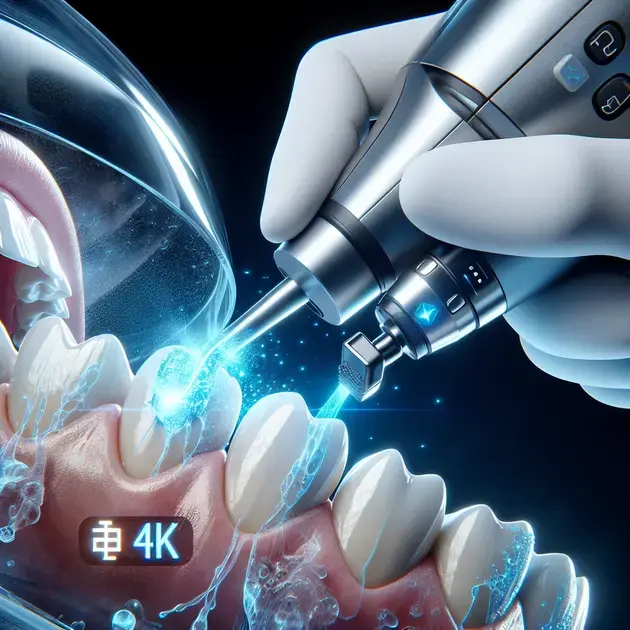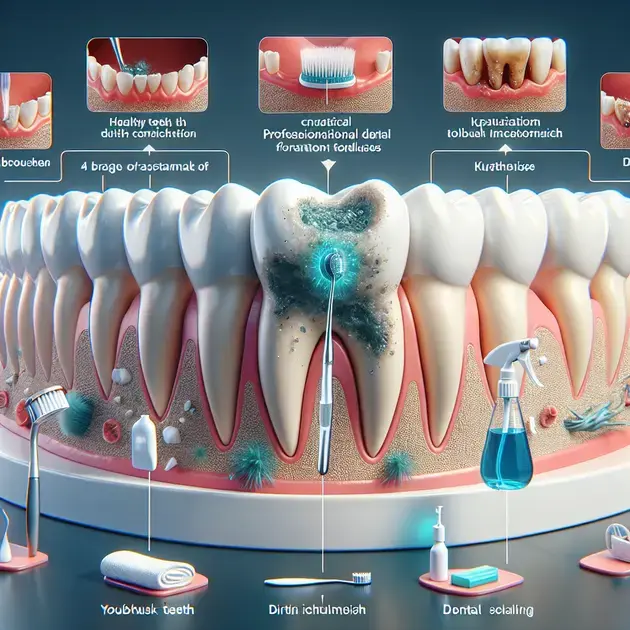When it comes to oral health, dealing with tartar on teeth is a common concern for many individuals. Tartar, also known as dental calculus, is a hardened plaque that can lead to various dental problems if not properly addressed. In this article, we will explore the causes, prevention, and treatment options for Tartar on Teeth.
With the advancements in dental technology, there are now several effective ways to remove tartar and prevent its buildup. Regular dental check-ups, proper oral hygiene practices, and professional cleanings are key components in managing tartar on teeth. Stay tuned as we delve into the best strategies to maintain a healthy smile and prevent Tartar on Teeth from causing any issues.

Causes of Tartar on Teeth
Tartar, also known as dental calculus, is a hardened plaque that forms on teeth due to the mineralization of dental plaque. The main cause of tartar buildup is inadequate oral hygiene practices. When plaque, a sticky film of bacteria, food particles, and saliva, is not removed from the teeth regularly through proper brushing and flossing, it can harden into tartar. Other factors contributing to tartar formation include:
- Poor brushing technique
- Irregular dental check-ups
- Consumption of sugary and starchy foods
- Smoking and tobacco use
To prevent tartar buildup, it is essential to maintain good oral hygiene habits, such as brushing teeth twice a day with fluoride toothpaste, flossing daily, and visiting the dentist for regular cleanings.
Prevention Strategies for Tartar Buildup
1. Use Tartar Control Toothpaste
Opt for toothpaste specifically designed to prevent tartar buildup. These toothpastes contain ingredients that help reduce tartar formation.
2. Regular Dental Cleanings
Schedule routine dental cleanings at least twice a year to remove any existing tartar and plaque buildup that cannot be removed through regular brushing and flossing.
3. Maintain a Balanced Diet
Eating a balanced diet low in sugary and starchy foods can help prevent plaque formation, which can ultimately lead to tartar buildup.
4. Use Water Flossers
Consider using water flossers in addition to traditional floss to remove plaque and debris between teeth effectively.
5. Chew Sugar-Free Gum
Chewing sugar-free gum after meals can stimulate saliva production, which helps neutralize acids and wash away food particles that contribute to tartar formation.
Effective Treatment Options for Tartar Management
1. Professional Dental Cleaning
Visit a dentist for a professional dental cleaning to remove tartar and plaque buildup effectively using specialized instruments.
2. Scaling and Root Planing
For more advanced tartar buildup, scaling and root planing procedures may be recommended to clean below the gum line and smooth the tooth roots to prevent future tartar accumulation.
3. Antimicrobial Mouthwash
Using antimicrobial mouthwash can help reduce bacteria in the mouth, preventing tartar formation and promoting overall oral health.
4. Dental Sealants
Dental sealants can be applied to the chewing surfaces of teeth to create a barrier against bacteria and plaque, reducing the risk of tartar buildup.
5. Regular Oral Hygiene Routine
Consistently follow a thorough oral hygiene routine at home, including brushing, flossing, and using mouthwash to prevent tartar formation and maintain healthy teeth and gums.

Understanding Tartar Formation
Tartar, also known as dental calculus, is a hardened plaque that forms on teeth due to the mineralization of dental plaque. This process occurs when plaque, a sticky film of bacteria, combines with minerals present in saliva and hardens over time. Tartar formation typically starts within 24 to 72 hours after the plaque formation. If not removed, tartar can lead to various dental issues such as gum disease, tooth decay, and bad breath.
Factors that contribute to tartar formation include poor oral hygiene, smoking, diet high in sugar and carbohydrates, and genetic predisposition. Individuals who consume sugary foods and beverages regularly are at a higher risk of tartar accumulation. Additionally, inadequate brushing and flossing habits allow plaque to build up and eventually mineralize into tartar.
Regular dental check-ups and professional cleanings are essential for preventing tartar formation. Dentists use special tools to remove tartar from teeth, a process known as scaling. Proper brushing and flossing techniques, along with using tartar control toothpaste, can help reduce plaque accumulation and minimize the risk of tartar formation.
Understanding the causes and process of tartar formation is crucial for maintaining good oral health. By adopting effective oral hygiene practices and seeking regular dental care, individuals can prevent tartar buildup and protect their teeth and gums from potential damage.
Tips for Tartar Prevention
Preventing tartar formation is key to maintaining optimal oral health and preventing dental problems. By following these simple tips, individuals can minimize the risk of tartar buildup and promote a healthy smile:
1. Brush and floss regularly:
Brushing your teeth at least twice a day and flossing once a day helps remove plaque and prevent tartar formation. Use a soft-bristled toothbrush and fluoride toothpaste for effective plaque removal.
2. Use tartar control products:
Consider using tartar control toothpaste and mouthwash to help prevent tartar buildup. These oral care products contain ingredients that inhibit plaque mineralization, reducing the chances of tartar formation.
3. Maintain a balanced diet:
Avoid sugary and starchy foods that can contribute to plaque formation. Instead, consume a diet rich in fruits, vegetables, and lean proteins to support overall oral health and prevent tartar accumulation.
4. Schedule regular dental cleanings:
Visit your dentist for professional cleanings every six months to remove tartar and plaque buildup. Regular dental check-ups can help identify early signs of tartar formation and prevent dental issues before they escalate.
5. Avoid smoking:
Smoking not only stains teeth but also increases the risk of tartar formation and gum disease. Quitting smoking can improve overall oral health and reduce the likelihood of tartar buildup.
Innovative Treatments for Tartar Removal
While traditional scaling and root planing are effective methods for tartar removal, advanced dental technologies have introduced innovative treatments for tackling stubborn tartar deposits. These cutting-edge techniques offer precision and efficiency in tartar removal, enhancing patient comfort and overall treatment outcomes.
1. Laser tartar removal:
Laser technology is utilized to target and break down tartar deposits on teeth. The focused laser energy helps dissolve tartar without the need for manual scraping, reducing discomfort and preserving healthy tooth structure.
2. Ultrasonic scaling:
Ultrasonic scalers use high-frequency vibrations to remove tartar and plaque from teeth. This advanced tool breaks down tartar deposits efficiently while minimizing damage to surrounding tissues, providing a gentle yet thorough cleaning experience.
3. Air abrasion:
Air abrasion systems use a combination of compressed air and fine abrasive particles to remove tartar and stains from teeth. This non-invasive technique is effective in tartar removal and offers a comfortable treatment option for patients with sensitive teeth.
4. Chemical tartar removal:
Chemical agents such as tartar dissolving solutions are applied to teeth to break down and soften tartar for easy removal. This method is often used in conjunction with traditional scaling to enhance tartar removal efficiency and overall cleaning results.
5. Intraoral cameras:
Intraoral cameras capture high-definition images of tartar deposits and oral structures, assisting dentists in identifying and targeting specific areas for tartar removal. This technology enables precise treatment planning and thorough tartar removal, ensuring optimal oral health outcomes for patients.
Conclusion
In conclusion, understanding the formation of tartar is essential for maintaining optimal oral health. Tartar, a hardened plaque that develops on teeth, can lead to various dental issues if not addressed promptly. Factors such as poor oral hygiene, diet, and genetic predisposition contribute to tartar accumulation, emphasizing the importance of preventive measures.
Tips for Tartar Prevention
Implementing simple practices like regular brushing and flossing, using tartar control products, maintaining a balanced diet, scheduling dental cleanings, and avoiding smoking can significantly reduce the risk of tartar buildup. These preventive steps play a crucial role in preventing tartar formation and promoting a healthy smile.
Innovative Treatments for Tartar Removal
While traditional scaling remains effective, advanced dental technologies offer innovative treatments for removing stubborn tartar deposits. Techniques such as laser tartar removal, ultrasonic scaling, air abrasion, chemical tartar removal, and intraoral cameras provide precise and efficient tartar removal, enhancing patient comfort and treatment outcomes.